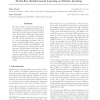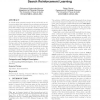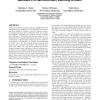37 search results - page 4 / 8 » Analysis of Inverse Reinforcement Learning with Perturbed De... |
ICML
2009
IEEE
16 years 8 days ago
2009
IEEE
We cast model-free reinforcement learning as the problem of maximizing the likelihood of a probabilistic mixture model via sampling, addressing both the infinite and finite horizo...
ATAL
2009
Springer
15 years 6 months ago
2009
Springer
In several agent-oriented scenarios in the real world, an autonomous agent that is situated in an unknown environment must learn through a process of trial and error to take actio...
105
click to vote
AAAI
1997
15 years 25 days ago
1997
We address the problem of visually detecting causal events and tting them together into a coherent story of the action witnessed by the camera. We show that this can be done by re...
103
click to vote
ICML
1995
IEEE
16 years 8 days ago
1995
IEEE
A number of reinforcement learning algorithms have been developed that are guaranteed to converge to the optimal solution when used with lookup tables. It is shown, however, that ...
GECCO
2006
Springer
15 years 3 months ago
2006
Springer
Both genetic algorithms (GAs) and temporal difference (TD) methods have proven effective at solving reinforcement learning (RL) problems. However, since few rigorous empirical com...



